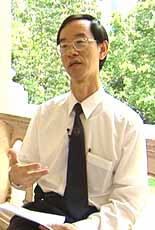 |
Imperfect science: HK Observatory Director Lam Chiu-ying says weather forecasting remains an imperfect science, but forecasters have worked hard to improve accuracy in recent years. |

|
As a weatherman, HK Observatory Director Lam Chiu-ying was torn between work and family when Typhoon Ellen approached Hong Kong 20 years ago. This was his chance to be on duty when the ultimate warning signal, No.10 was hoisted.
But it was a chance he had to give up, reluctantly, because as a family man, his wife and young children came first.
Mr Lam said that because of his career, he wanted to stay on duty when Typhoon Ellen stormed into Hong Kong.
"However, I chose to leave the office at the end of my shift when the storm was approaching and went home to take care of my wife and young children."
Recalling that night in 1983, Mr Lam said he still believed he made the right decision, but it had not been an easy one.
He and his colleagues had waited a long time for the opportunity to hoist the No.10 signal.
"It was late at night, I could see that we were getting close to No 9 and No 10. But then at that time I had a young wife and two very young kids - they needed me," he said.
At nature's mercy
"After a lot of weighing up, I decided to go home at the end of my shift. While I was on the way, it was raining hard, winds were blowing very strong. My car was hit by falling branches.
"The drive itself was really exciting. It gave me, as a weatherman, an experience to see how powerful nature is. Finally, I arrived home safely."
Shortly after he arrived, signal No.9 was hoisted, and then 10 soon afterwards.
"So I missed the No.10!" he said, adding he had to wait 16 years for another No.10 signal to be hoisted.
"Eventually I got the No.10 in 1999 during Typhoon York. This time I had no worries. It was daytime and my children had grown up."
Paradise between two hells
"It was an exciting time. Hoisting the ultimate signal means that you have a direct hit from a full-blown typhoon. Winds would be very strong coming from one direction, then all would be quiet for a moment, then strong winds would come in from another direction. It was just like paradise between two hells.
"All you can do is just sit and wait and see what will happen. It demonstrates how powerless humans are in the face of nature."
Despite that, the observatory had in the past few decades spared no effort in improving its forecasts to reduce the impact of natural disasters on our lives and the economy.
Forecasts becoming more accurate
Mr Lam said it was a combination of scientific data and the experience of weather forecasters that allowed the observatory to make its predictions.
"Our mission is to ensure no lives will be lost, or a minimum of lives will be lost, in natural disasters."
But he concedes that up to now, weather forecasting remains an imperfect science.
"It will be wrong from time to time. It is important that we realise that we cannot be right all the time. We need to remove the psychological burden in forecasting," he said.
"This is something that I have tried to explain to my observatory colleagues. I do not feel particularly bad when we receive comments that our forecast is inaccurate."
He says that even when they get it wrong, he is satisfied that forecasters have tried their best, saying: "We have worked hard to improve our accuracy. When the criticism is really unreasonable, it does no harm. We can just ignore it."
Multiple tasks
The observatory operates an atomic clock, which serves as Hong Kong's time standard. People can adjust their watches and computer clocks by checking the department's telephone time-check service or by logging on to the observatory's website.
"Actually this is really big business for us, there are millions of checks every month," he said.
The observatory also measures radioactivity in the environment in relation to the Daya Bay Nuclear Power Plant. It assesses earthquake risk in Hong Kong too.
A wealth of experience
Mr Lam joined the observatory in 1974 and was promoted to head of the department in March 2003.
He has a degree in physics and a second degree in meteorology.
He said he developed his interest in astronomy and weather when he was a young boy.
"I would hoist the typhoon signal at home when the observatory hoisted the signal officially. After finishing study, I joined the observatory and turned my interest into a job."
Mr Lam admits that for some, turning an interest into a career could be a disaster, because they would be doing the same thing day in and day out.
"But luckily, after joining the observatory, I picked up a wide range of interests, such as bird watching, travelling, languages, and many other things," he said.
So the chances of Mr Lam ever growing tired of observing the weather are about as slim as the No.10 signal being hoisted.
Go To Top
|



